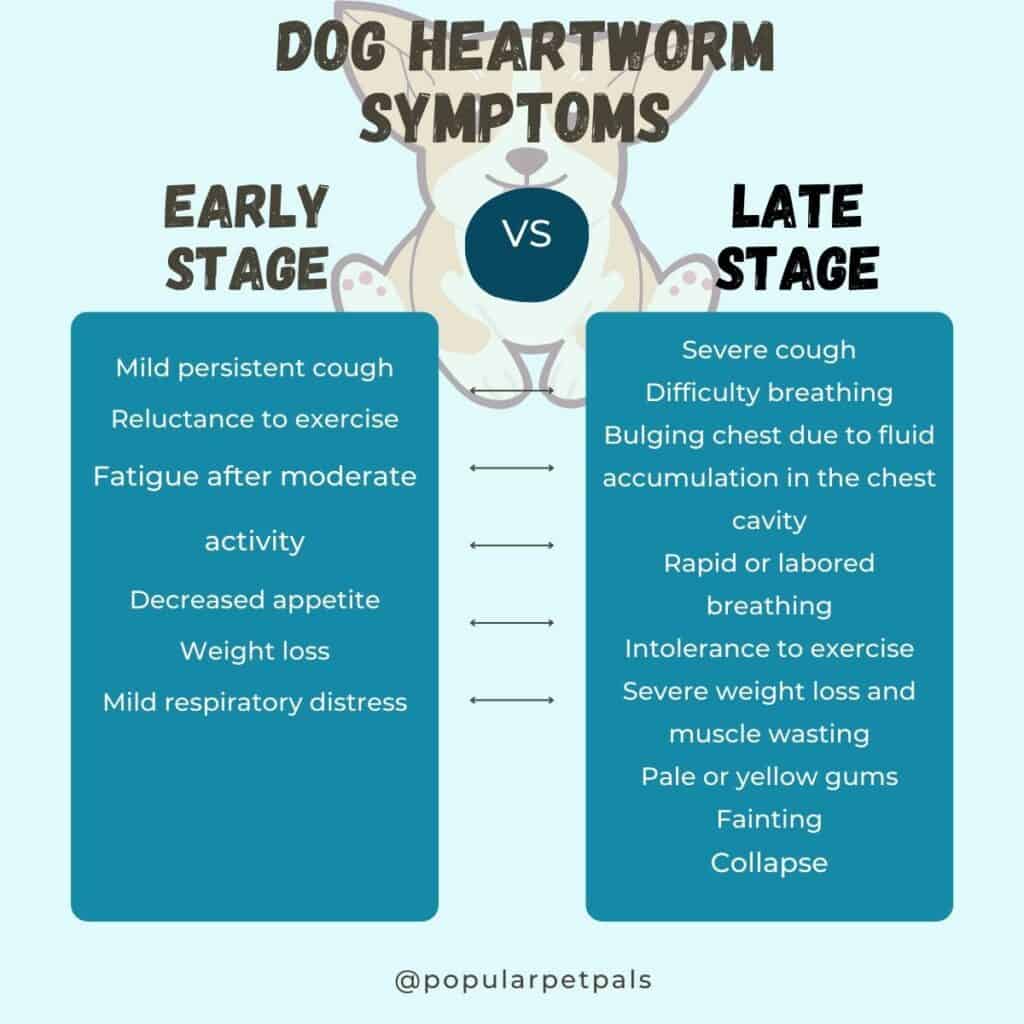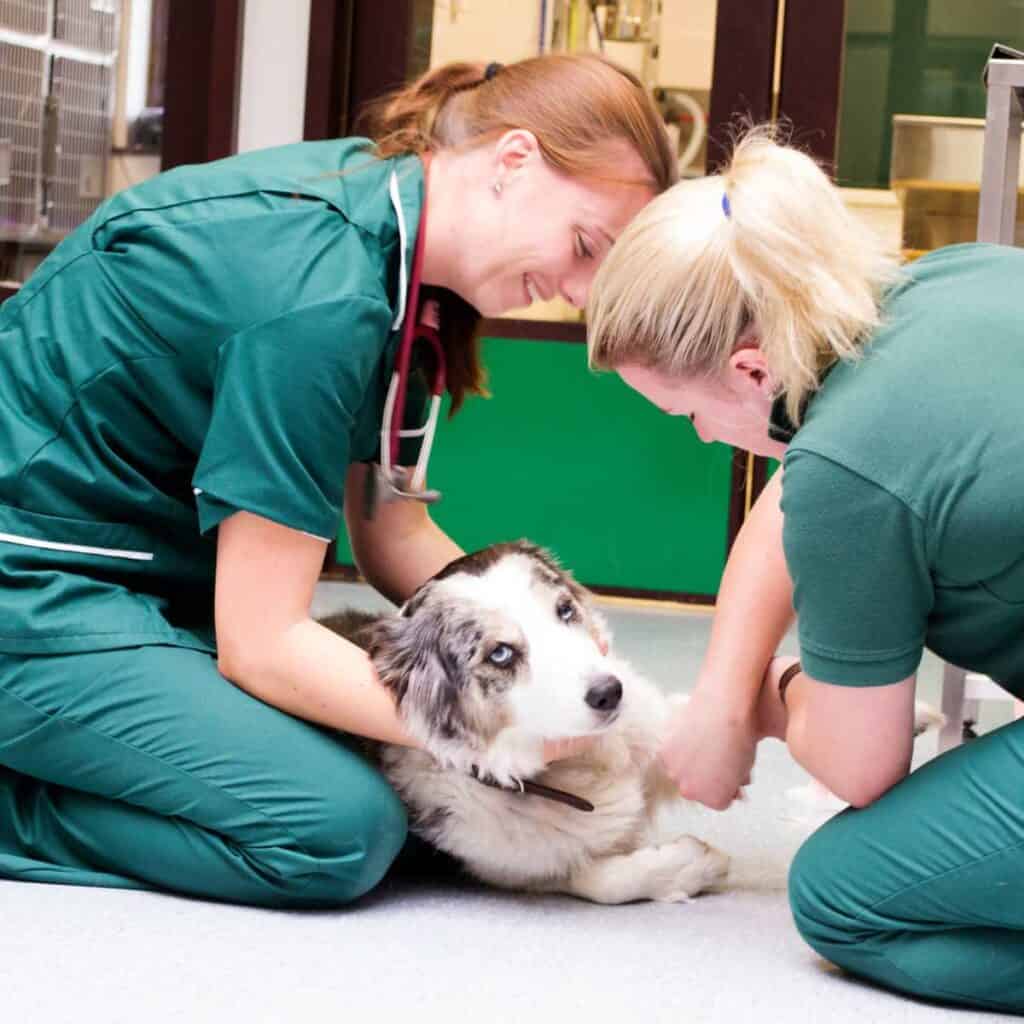April is National Heartworm Awareness Month! At Popular Pets we love to celebrate certain healthy dog awareness events to ensure we all have the best knowledge since as pet parents, we all want our furry friends to live long, healthy lives. We have discussed other dog worms but unfortunately, heartworm is different and this disease can put a serious damper on that goal. Heartworm disease is a sneaky little devil that can creep up on our pups and wreak havoc on their hearts, lungs, and other organs. But fear not! With a little knowledge of dog heartworm symptoms and signs and awareness, we can all protect our pups from heartworm disease and its nasty side effects and get on the path to heartworm prevention and heartworm cure.

What is Dog Heartworm Disease?
Heartworm disease is a serious condition that affects dogs (and sometimes cats). It’s caused by a parasitic worm called Dirofilaria immitis, which gets into the bloodstream and makes its way to the heart and lungs.
Here’s how it works: the heartworm larvae are carried by mosquitoes, and when a mosquito bites a dog, it can transfer those larvae into the dog’s bloodstream. From there, the larvae start to grow and mature, eventually making their way to the heart and lungs.
Once they’re settled in, heartworms can cause all sorts of problems. They can damage the heart and lungs, making it harder for the dog to breathe and move around. They can also cause inflammation and blockages in blood vessels, which can lead to further complications.

What are Dog Heartworm Symptoms and Signs?
So, what are the signs that your dog has heartworm disease? Heartworm disease can cause a variety of symptoms in dogs, and the severity can vary depending on the stage of the disease. Here are some common signs and symptoms to watch out for:
Coughing: A persistent cough is one of the most common signs of heartworm disease in dogs. The cough may be dry or moist and can be more noticeable after exercise.
Fatigue: Dogs with heartworm disease may seem more tired than usual and may be less interested in physical activity.
Weight loss: If your dog is losing weight despite eating normally, it could be a sign of heartworm disease.
Difficulty breathing: As heartworms invade the lungs, it can become harder for dogs to breathe. This can cause panting, wheezing, or shortness of breath.
Decreased appetite: Dogs with heartworm disease may lose their appetite or have trouble eating.

Swollen abdomen: As the heartworms grow and multiply, they can cause fluid buildup in the abdomen, leading to swelling.
If you notice any of these symptoms in your dog, it’s important to take them to the vet as soon as possible. Early detection and treatment are key to helping your dog recover from heartworm disease.
But don’t fret! There is a cure for heartworm disease, and the earlier it’s caught, the better.
Late Stage Heartworm Symptoms in Dogs
Late-stage heartworm disease can be very serious and can cause a range of symptoms that can be very distressing for your dog. Here’s a more detailed description of the late-stage symptoms of heartworm disease in dogs:
Severe cough: Dogs with late-stage heartworm disease may develop a persistent, hacking cough that can be very distressing. This cough is caused by the damage that the heartworms cause to the lungs, which can lead to inflammation, fluid buildup, and irritation.
Difficulty breathing: As the heartworms continue to damage the lungs, it can become harder and harder for your dog to breathe. Your dog may start to pant heavily, wheeze, or struggle to catch their breath.
Bulging chest: In some cases, dogs with late-stage heartworm disease may develop a bulging chest due to fluid accumulation in the chest cavity. This can put pressure on the lungs, making it even harder for your dog to breathe.
Rapid or labored breathing: Dogs with heartworm disease may also experience rapid or labored breathing, which can be very distressing for them.
Intolerance to exercise: As the disease progresses, your dog may become less and less able to tolerate exercise. Even a short walk can leave them panting and exhausted.
Severe weight loss and muscle wasting: Dogs with heartworm disease may lose a significant amount of weight and muscle mass. This can make them look gaunt and weak.
Pale or yellow gums: Heartworm disease can also affect your dog’s blood cells, leading to anemia. This can cause their gums to appear pale or even yellow.
Fainting: In severe cases, dogs with heartworm disease may even faint or collapse due to the strain on their heart and lungs.
As you can see, the symptoms of late-stage heartworm disease can be very serious and can significantly impact your dog’s quality of life, these symptoms if in an older or senior dog may also be confused with standard signs aging. That’s why it’s so important to take your dog to the vet for regular checkups and to have them tested for heartworm disease on a regular basis. If your dog does develop heartworm disease, early treatment can help prevent the disease from progressing to a more advanced stage.

What are Heartworm Cures?
To cure heartworm various treatments are available and hearworm cure usually involves a combination of medication, rest, and close monitoring by your veterinarian. Of course, as with any treatment, there can be some side effects to watch out for, like vomiting, diarrhea, and lethargy.
Treatmentand cures for heartworm disease involves a combination of medication, rest, and monitoring. Here’s a breakdown of the different steps involved in heartworm treatment:
Stabilization: Before treatment can begin, your vet will need to stabilize your dog’s condition. This may involve medications to reduce inflammation and improve breathing, as well as rest and monitoring to ensure that your dog is stable enough for treatment. The need for this treatment will depend on the seriousness of the progression of heartworm in your dog at the time of treatment.
Adulticide treatment: The primary treatment for heartworm disease is a medication called an adulticide, which is designed to kill the adult heartworms living in your dog’s heart and lungs. This treatment is typically administered over a period of several weeks, and it may require multiple injections or oral medications.
Microfilariae treatment: In addition to killing the adult heartworms, your dog will also need to be treated for the microfilariae (baby heartworms) that are circulating in their bloodstream. This treatment usually involves a medication called an microfilaricide, which is designed to kill the microfilariae. This will prevent additional larvae from reaching the lungs and heart.
Rest and monitoring: After treatment is complete, your dog will need to rest and recover for several weeks or even months. During this time, your vet will monitor their condition closely to ensure that there are no complications and that the heartworms are not returning.
It’s important to note that heartworm treatment can be expensive and can also be very hard on your dog. However, early detection and treatment are crucial for ensuring the best possible outcome for your dog. That’s why it’s so important to have your dog tested regularly for heartworm disease and to take preventative measures to protect them from heartworms in the first place. Your vet can provide you with more information on the best way to protect your dog from heartworm disease and how to keep them healthy and happy.
How Much Does Heartworm Testing and Heartworm Treatment Cost?
Heartworm is a disease that is very impactful for rescue organizations, like Best Friends Animal Society, that needs to focus on heartworm prevention and cures so that dogs can find their forever homes, heartworm free. Best Friends, vet Dr. Mandi Shearhart, DVM, provided us with some helpful information about the cost of heartworm prevention for dogs.
Dr. Shearheart says that “the cost of heartworm testing will generally range anywhere between $30 to $80 depending on the type of test run as well as the geographic area and individual clinic. This is also sometimes bundled with other services as part of a yearly wellness visit. Heartworm preventatives can range from as little as $4 a month up to $40 a month depending on the size of your dog, the type of prevention and what other parasites it may protect against, and the place of purchase.”
Dr. Shearheart notes that sometimes rebates and discounts are available for purchasing a year’s supply at a time or a combination of products. It is always best to have a conversation with your veterinarian to discuss the best testing and preventative options for your individual pet.

How Much Does Dog Heartworm Treatment Cost?
The cost of heartworm treatment for dogs can vary depending on a number of factors, including the severity of the disease, the size and age of your dog, and the region in which you live. Generally speaking, heartworm treatment cost can be expensive, and the cost can range from several hundred to several thousand dollars.
The cost of heartworm treatment typically includes the cost of diagnostic tests (such as blood tests and imaging studies), the cost of the medications used to treat the heartworms, and the cost of monitoring your dog’s condition throughout the treatment process. Additionally, there may be costs associated with follow-up care and additional medications to manage any side effects or complications that may arise.
It’s worth noting that the cost of treating heartworm disease is significantly higher than the cost of preventing it. That’s why it’s so important to take preventative measures to protect your dog from heartworms in the first place, such as using monthly heartworm preventative medications and minimizing their exposure to mosquitoes.
If you suspect that your dog may have heartworm disease, it’s important to take them to the vet as soon as possible for diagnosis and treatment. Your vet can give you a better idea of what the cost of treatment may be for your dog and can work with you to develop a treatment plan that meets your dog’s individual needs and your budget and some treatments may be covered by your pet insurance.
Dog Heartworm Treatment Side Effects
Heartworm treatment for dogs can have side effects, and the severity and duration of these side effects can vary depending on the individual dog and the specific treatment plan used. Some of the most common side effects of heartworm treatment in dogs include:
Pain and swelling at the injection site: Many of the medications used to treat heartworm disease are administered by injection, which can cause pain, swelling, and tenderness at the injection site.
Lethargy and weakness: Dogs undergoing heartworm treatment may experience fatigue, lethargy, and weakness as their bodies work to eliminate the heartworms and recover from the effects of the medication.
Decreased appetite and weight loss: Some dogs may experience a decrease in appetite and lose weight during heartworm treatment, which can be caused by the stress of the treatment or by gastrointestinal side effects from the medication.
Diarrhea and vomiting: Certain heartworm medications can cause gastrointestinal side effects, such as diarrhea and vomiting. These side effects are usually mild and can be managed with supportive care and medication.
Respiratory distress: In rare cases, dogs undergoing heartworm treatment may experience respiratory distress, which can include coughing, wheezing, and difficulty breathing. This can be a sign of a serious reaction to the medication and requires immediate veterinary attention.
It’s important to note that not all dogs will experience side effects from heartworm treatment, and in most cases, any side effects that do occur are mild and temporary. Your vet will monitor your dog closely throughout the treatment process and can provide you with information on how to manage any side effects that may arise. Additionally, if you notice any unusual symptoms or behaviors in your dog during heartworm treatment, it’s important to contact your vet right away to ensure that they receive prompt care.
Conclusion
The bottom line is, heartworm disease is a serious condition, but it’s entirely preventable and treatable with the help of your vet. So, make sure you schedule regular heartworm screenings for your pup and talk to your vet about preventative measures. Together, we can keep our furry friends healthy and happy for years to come!
Dog Heartworm FAQs
Heartworm in dogs can be cured! If you think your dog has heartworm you need to test them and then get them on heartworm medicine. The sooner you detect it the less expensive and manageable the treatment will be.
If dogs get heartworms they can experience damage to the heart, lungs, and other organs. Heartworm disease is caused by a parasitic worm called Dirofilaria immitis that is transmitted through the bites of infected mosquitoes. Once a dog is bitten by an infected mosquito, the immature heartworms enter the bloodstream and travel to the heart and lungs, where they mature and reproduce. The presence of these heartworms can cause significant damage to the dog’s heart, lungs, and other organs. As the worms grow and multiply, they can block blood flow and cause inflammation, leading to a variety of symptoms and health problems.
Dogs can live after getting heartworm disease with appropriate treatment. The earlier the disease is detected and treated, the better the chances of a successful recovery. However, the treatment process can be lengthy and expensive, and there is always a risk of complications, especially in advanced cases.
Looking to learn more about taking charge of your Dog’s Health? Learn about Pet Testing from The Popular Pets. Now offering pet testing for your the health of your pet and your peace of mind. Learn more about pet testing options.
You may also be interested in the Ultimate Guide to Heartworm
Diatomaceous Earth for Dogs and Cats FAQ
Diatomaceous earth is great for dogs and is safe to ingest and put on their skin, sniffing diatomaceous earth is not a problem but dog owners do need to be careful that dogs do not inhale DE further. The silica in DE can be harmful to dog and cat lungs, especially pets with respiratory issues. The many benefits of DE make it a useful pet wellness tool.
Since DE is an excellent addition to food due to its ability to kill parasites, bind collagen and support a healthy coat and joints, licking DE is not only beneficial but suggested. DE is safe for dogs but dog lovers should get food grade DE to be safe.
Diatomaceous earth will not harm dogs. DE is non-toxic and actually helpful for dogs due to its many wellness attributes. Pet lovers have found many benefits to adding DE to their pet’s food to help support a healthy coat and fend off parasites and on externally to help with fleas and ticks.

